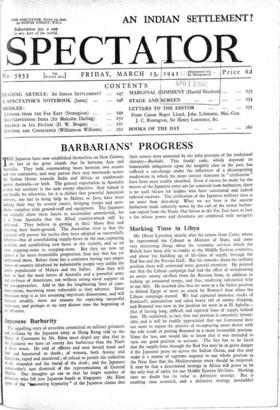Marking Time in Libya
Mr. Oliver Lyttelton shortly after his return from Cairo, where he represented the Cabinet as Minister of State, said some very interesting things about the economic services which the British have been able to render to the Middle Eastern countries, and about the building up of life-lines of supply through the Red Sea and the Persian Gulf. But his remarks about the military position there will command more general attention. He pointed out that the Libyan campaign had had the effect of withdrawing an entire enemy air-fleet from the Russian front, in addition to locking up armoured troops, and thus rendering substantial help to our Ally. He asserted also that we were in a far better position to defend Egypt or meet an attack by Rommt-1 than when the Libyan campaign started. We had captured immense stocks of Rommel's ammunition and taken heavy toll of enemy shipping, and Rommel was now in the position we were in at El Agheila- that of having long, difficult and exposed lines of supply behind him. He explained, in fact, that our position is extremely favour- able, and it will be readily appreciated that our Command does not want to repeat the process of re-capturing more desert with the sole result of putting Rommel in a more favourable position. None the less, one would like to know that it was intended to turn our good position to account. The fact has to be faced that the supply-lines through the Red Sea may be in grave danger if the Japanese press on across the Indian Ocean, and this may make it a matter of supreme urgency to our whole position in the Near East that the Mediterranean route should be reopened. It may be that a determined strategy in Africa will prove to be the only way of safety for our Middle Eastern life-lines. Marking time no doubt has its value as defensive strategy. But is marking time essential, and a defensive strategy inevitable?


























